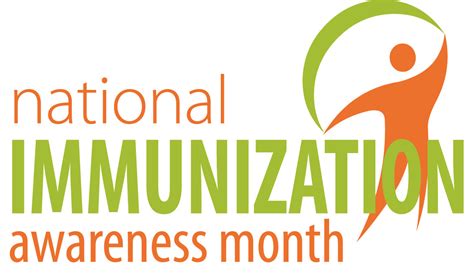August is National Immunization Awareness Month, highlighting the importance of immunizing people of all ages. Vaccines have reduced and, in some cases, eliminated many diseases that killed or severely disabled people just a few generations ago.
Immunizations represent one of the greatest
public health accomplishments of the 20th century.
Babies and Young Children
Vaccines have been proven to protect children from 14 serious diseases before they turn two years old. Vaccinate your children according to the recommended schedule to protect them from potentially deadly diseases such as measles and whooping cough (pertussis). Vaccines don’t just protect your child – they also protect other children and others who may not be able to be vaccinated, especially babies who are too young to be vaccinated themselves.
Recommended vaccines for children from birth through six years of age:
- Hepatitis B

- Rotavirus
- DTaP (diphtheria, tetanus, and pertussis)
- Hib (Haemophilus influenza type b)
- PCV13 (pneumococcal disease)
- IPV (inactivated polio vaccine)
- Flu (annually starting at six months of age)
- MMR (measles, mumps and rubella)
- Varicella (chickenpox)
- Hepatitis A
Talk to your child’s health care provider about when your child should be vaccinated to ensure that they are on schedule.
School-Age Children, Pre-teens and Teens
 Many vaccine-preventable diseases can easily spread in child care and school settings. Child care facilities, preschool, and school programs are prone to outbreaks of infectious disease. Children in these settings can easily spread illness to one another due to poor handwashing, not covering coughs, and other interactions in crowded environments. When children are not vaccinated, they are at increased risk for disease and can spread disease to others. Additionally, most schools require children to be vaccinated against certain diseases before enrollment to protect the health of all students. Keep in mind that some vaccines require a booster dose for the best protection, so adhering to the vaccine schedule will ensure that your child does not miss a dose.
Many vaccine-preventable diseases can easily spread in child care and school settings. Child care facilities, preschool, and school programs are prone to outbreaks of infectious disease. Children in these settings can easily spread illness to one another due to poor handwashing, not covering coughs, and other interactions in crowded environments. When children are not vaccinated, they are at increased risk for disease and can spread disease to others. Additionally, most schools require children to be vaccinated against certain diseases before enrollment to protect the health of all students. Keep in mind that some vaccines require a booster dose for the best protection, so adhering to the vaccine schedule will ensure that your child does not miss a dose.
Vaccinations for school-age children, pre-teens and teens:
- Flu (annually)
- HPV (human papillomavirus)
- Meningococcal conjugate (meningitis)
- Tdap (tetanus, diphtheria, and pertussis)
- Serogroup B Meningococcal (MenB)
Pregnant Women and their Partners
When you are pregnant, you share everything with your baby. That means when you get vaccines, you aren’t just  protecting yourself – you are giving your baby some early protection, too. Some vaccines, such as MMR (measles, mumps, rubella), should be given a month or more before your pregnancy.
protecting yourself – you are giving your baby some early protection, too. Some vaccines, such as MMR (measles, mumps, rubella), should be given a month or more before your pregnancy.
Pregnant women should receive Tdap (tetanus, diphtheria, pertussis) during the third trimester of each pregnancy to pass short-term protection from whooping cough along to the baby. Fathers-to-be, grandparents-to-be, and anyone who will be caring for your child should also be current with Tdap vaccinations to prevent spreading disease to the new baby.
The flu can cause severe illness in pregnant women. The flu shot given during pregnancy has been shown to protect both mother and baby from flu for several months after birth.
Adults
Even healthy adults can become seriously ill and pass diseases along to others. All adults should have their needs assessed by their health care provider to determine which vaccinations they need. Certain vaccines are recommended based on a person’s age, occupation, or health conditions (such as asthma, diabetes or heart disease).
Recommended vaccinations for adults:
- Flu (annually)
- Tdap (if not received as a teen)
- Td (tetanus, diphtheria – booster every 10 years after Tdap vaccine)
- Shingles
- Pneumococcal (for adults 65 and over or with high-risk conditions)
- Hepatitis A, Hepatitis B, HPV (depending on age, occupation, travel, medical conditions, vaccinations they have received, or other considerations.)
For more information about immunizations and an easy-to-read vaccination schedule, visit the Centers for Disease Control and Prevention website.


